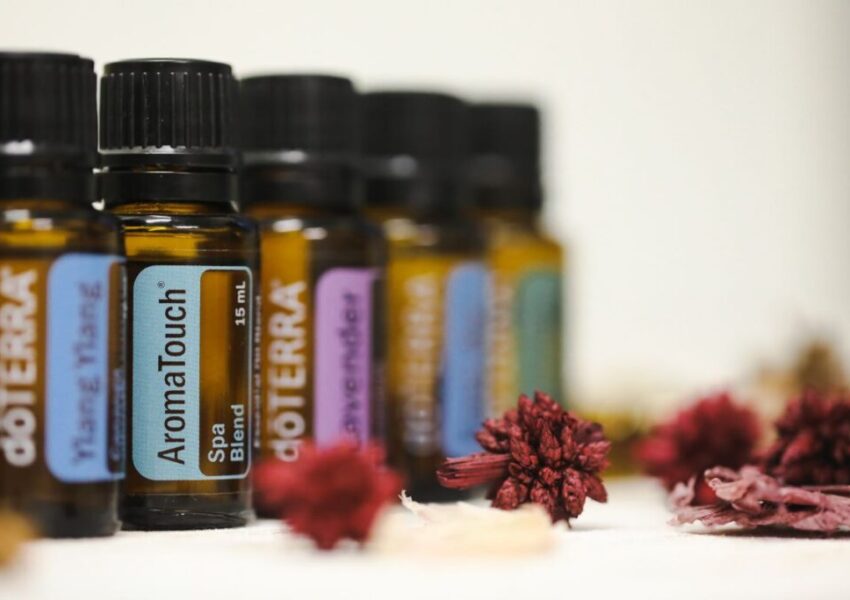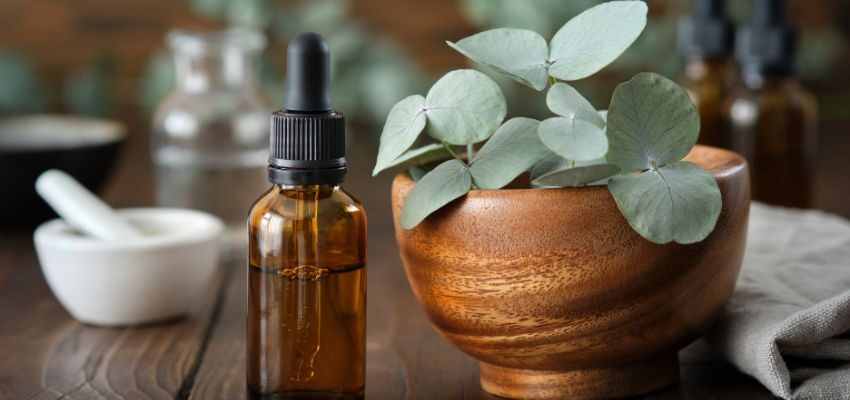10 Amazing Essential Oils To Alleviate Allergies

Published February 28, 2024
Allergies are a widespread concern impacting millions worldwide. Allergic reactions can transform daily life into a continuous struggle. It can cause sneezing, itching, or severe reactions like anaphylaxis. The immune system’s exaggerated response to common substances challenges those affected.
Essential oils provide aromatic comfort and promise to reduce allergy symptoms. Potential allergens are abundant around us. Essential oils offer a fragrant remedy for allergies. In this article, we’ll explore how these essential oils for allergies could be the key to managing them and relieving those in need.
Understanding Essential Oils
Essential oils are potent plant-derived extracts that capture their source’s natural aroma and essence. These oils are commonly used in aromatherapy, an alternative medicine practice, and promote health and wellness.
Research shows that specific essential oils may aid in alleviating allergy symptoms by diminishing inflammation and easing congestion.
Top Essential Oils For Allergies
Most might ask—what essential oil is good for allergies? Incorporating several essential oils into your daily routine can help alleviate allergy symptoms. Although research on essential oils is still ongoing, experimenting with aromatherapy using these oils could offer relief. However, it’s critical to consult your doctor beforehand for precautionary measures.
Here are a few options you might consider trying first:

1. Peppermint
An essential oil for allergies on top of the list is peppermint. Peppermint oil is versatile and famous for its refreshing aroma and cooling properties. It has a fresh, uplifting scent that acts as a natural decongestant to aid in clearing the nasal passages. If you often get nasal congestion from seasonal allergies, keep peppermint handy. It’s also an anti-inflammatory, and topical preparations help ease pruritus and irritation.
In one study conducted on animals, peppermint produces a relaxing effect on the smooth muscles, helping reduce the contractions that trigger coughing.
2. Lavender
Among the essential oils on the market, lavender reduces stress and anxiety, promoting relaxation. The oil can also ease seasonal allergies. It does this by stopping airway inflammation and growth of mucus cells. It also boasts anti-inflammatory and antimicrobial benefits. Lavender is a potent yet gentle choice to soothe irritation, promote peaceful breathing, and support skin health.
There are many ways to use lavender to enjoy its benefits. You may use it in a diffuser for aromatherapy, soak it in a bath after diluting it in a carrier oil, or apply it directly to your skin. You can also add it to other skin products to enhance their effectiveness.

3. Eucalyptus
Many people recognize eucalyptus for its ability to clear the sinuses and boost breathing. It offers a refreshing and revitalizing experience. It plays a vital role in maintaining respiratory wellness by improving circulation and reducing allergy symptoms with its analgesic and anti-inflammatory properties.
In one study, a blend of oils, including eucalyptus, could ease the symptoms of upper respiratory tract conditions such as cough, sore throat, and hoarseness.
4. Tea Tree
Tea tree oil is famous for its potent antiviral, antifungal, and antibacterial properties. It’s a viable option for treating specific skin allergies. It also has anti-inflammatory properties, which can help alleviate the inflammatory symptoms of allergies, such as inflamed sinuses and nostrils.
Remember, tea tree oil might cause allergic contact dermatitis. This is due to its strength in some people with sensitive skin. A skin patch test is crucial before using. Remember that you should only use the oil topically and avoid ingestion.
5. Lemon
With its energizing and cleansing properties, lemon oil is valuable for combating respiratory ailments and supporting the lymphatic system. The bright and uplifting aroma of lemon can revitalize the senses.
One study showed that using a lemon-based nasal spray eased perennial and seasonal allergic rhinitis. It can help deal with the common symptoms of seasonal allergies by clearing sinus congestion. It has antibacterial properties, which can eliminate allergy triggers such as dust and animal dander in your home.
6. Chamomile
Chamomile oil is a gentle remedy for skin irritations caused by allergies and is known for its calming and soothing effects. Its gentle aroma and skin-nourishing properties make it popular. It’s used for promoting relaxation and skin health.
It also boasts anti-inflammatory properties, which can aid in managing skin conditions, sinusitis symptoms, and inflammation of the mucous membranes. Applying topically with a carrier oil may also lessen the itchiness and swelling due to eczema. Use a diffuser to help you relax and breathe better if you have swollen airways from allergies.

7. Frankincense
Frankincense oil is an ancient oil with profound therapeutic properties known for its anti-inflammatory benefits and immune-supporting qualities.
For coughing episodes during allergy season, frankincense oil helps reduce your cough. It soothes the inflammation in the airways, allowing better breathing.
8. Rosemary
With its natural anti-inflammatory properties, rosemary essential oil is a versatile remedy that can help ease allergy symptoms and improve overall well-being. Its fresh, herbaceous scent can enhance mental clarity and focus.
Rosemary oil also has antispasmodic and antihistamine properties, which help ease airway blockage with wheezing due to seasonal allergies. It also helps lessen the muscle spasms associated with frequent coughing episodes.

9. Thyme
With its immune-boosting properties and natural remedy potential for allergic reactions, thyme is a powerful essential oil. Its warm and herbaceous aroma can provide comfort and vitality, making it a valuable addition to wellness routines.
Thyme contains thymol, one of its main constituents that helps manage upper respiratory system issues. As an expectorant, thymol can aid in clearing phlegm from the airways.
10. Basil
For those suffering from undesirable symptoms during allergy season, basil supports the immune system. It also has antimicrobial properties that clear toxins and open the airways.
One study reveals that basil oil is toxic to dust mites, one of the leading triggers of allergy symptoms. Mixing basil essential oil with water in a spray bottle can serve as a household cleaner to eliminate dust mites.
Another recent research shows that basil oil possesses relaxant properties. Doing so allows it to manage respiratory conditions effectively.

How To Use Essential Oils For Allergies
Now that you know the recommended essential oils for allergies, you must know how to use them properly. Using essential oils for allergies can offer significant benefits. Here are several recommended methods.
- Direct inhalation. Inhale directly from the bottle or place a few drops on a cotton ball for a soothing aroma.
- Diffusion. Add 2-5 drops of your preferred essential oil to your diffuser, customizing the blend as you like.
- Topical application. For topical use, mix 2-3 drops each of peppermint, eucalyptus, and lavender oils with a teaspoon of coconut oil before applying to the skin.
- Steam inhalation. Inhale fragrant steam by adding essential oil drops to hot water and covering your head with a towel.
- Bath. Make your bath experience refreshing by adding a few drops to the warm water and relaxing for at least 15 minutes.
Potential Side Effects Of Essential Oils
Essential oils offer numerous benefits, but knowing the potential risks is crucial. Here are some of the risks and side effects you need to know.
- Skin irritation and burning sensation
- Asthma symptoms
- Skin allergy symptoms such as redness, hives, itchiness and swelling
- Irritation of the eyes, nose, and throat
In some cases, adverse effects can occur, ranging from mild to severe, with rare fatalities reported. The common adverse effect is dermatitis, usually triggered by lavender, peppermint, and tea tree oil.

Safety Precautions For Using Essential Oils
Use essential oils for allergies with care and prudence. Here are some key precautions and safety guidelines to consider.
- Dilution is key. Before skin application, dilution with a carrier oil is crucial to prevent allergic reactions or irritation.
- Patch test. Perform a patch test before using one. Dab a small amount of diluted oil to your skin. Wait 24 hours to observe any reactions. Doing so will help you avoid any unwanted skin reactions or allergies.
- Ingestion caution. Refrain from ingesting essential oils without professional guidance, as some oils can be toxic if consumed.
- Pregnancy and breastfeeding. During pregnancy and breastfeeding, it’s important to avoid certain essential oils. It’s always important to consult a healthcare professional before using essential oils.
- Considerations for children and elderly. Be mindful when using essential oils around children or older adults, as they may be more sensitive to their effects.
- Eye and mucous membranes. Direct contact with essential oils may irritate eyes or mucous membranes.
- Proper storage. Keep essential oils in a cool, dark place, out of reach of children and pets, to preserve their potency.
- Medication interactions. Consult with your healthcare provider if you intend to use essential oils while taking any medication, as there may be interactions.

Essential Oils As A Natural Solution For Allergies
Essential oils for allergies are a natural and promising alternative for alleviating the burdens of bothersome symptoms. When using essential oils, exercise caution and seek guidance from healthcare professionals. The aromatic world of essential oils awaits, ready to offer a breath of freshness in your journey towards allergy management.
Benefit From The Latest Advancements In Probiotic Science With Bionaze
Bionaze is a proprietary blend of probiotics proven to promote ear, nose, and throat health, improve digestion, and support your immune system. The active ingredients BLIS K12, and BL-04 are considered among the best probiotics according to science.
Get 25% Off Your First Order when you use BIO25 at checkout!

This Content Has Been Reviewed For Factual Accuracy
This content has undergone thorough fact-checking by our team of internal experts. Learn more about the meticulous editorial standard for our website here.
ADVERTISEMENT

About The Author
Hi, I’m Corinne Grace, a proud nursing graduate from Riverside College with a flair for writing. I specialize in health and wellness topics, using my educational background to weave informative and attention-grabbing articles that appeal to a wide variety of readers.




